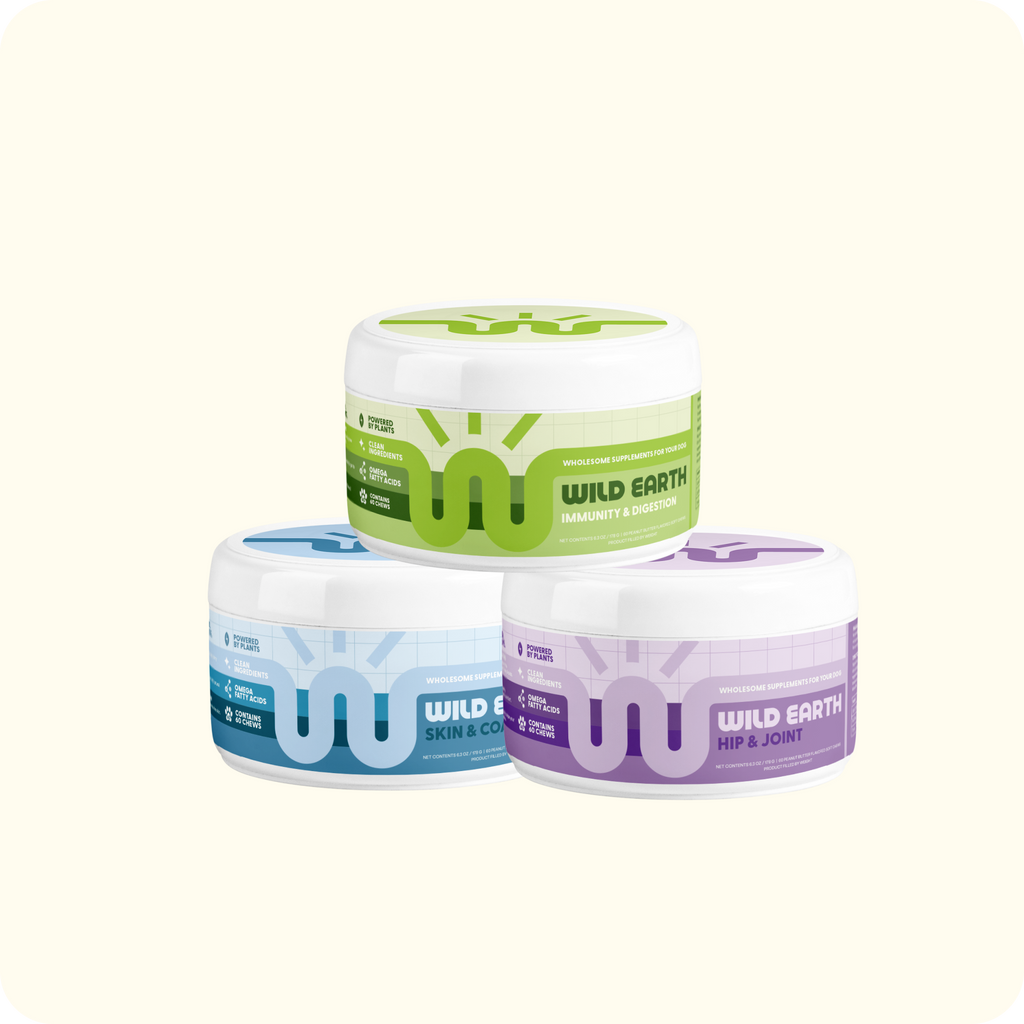

Apple Cider Vinegar For Dogs: The Risk and Benefits of Feeding ACV to Your Dog
Summary
-
Apple cider vinegar (ACV) can support your dog’s health when used correctly, offering possible benefits for digestion, skin, urinary health, and ear cleanliness.
-
Always choose raw, organic, unfiltered ACV for maximum nutritional benefits, and never use it undiluted.
-
ACV must be diluted, whether you're adding it to food or applying it to the skin, to avoid irritation or stomach upset.
-
Start with small amounts (like ¼ tsp for small dogs) and watch for any reactions before increasing the dose.
-
ACV is not safe for all dogs, especially puppies or those with kidney disease, acid reflux, or who are on certain medications.
-
ACV is not a cure-all. It’s a supportive supplement, not a replacement for professional veterinary care. Always talk to your vet first.
You love your dog like family, so it's only natural to want to explore every possible way to keep them happy, healthy, and full of tail wags. Lately, apple cider vinegar (ACV) has been making the rounds in pet care conversations. And yes, it’s the same tart liquid you might splash on a salad or sip for gut health.
But can it really help your dog? The short answer: maybe. When used correctly and always with your vet’s guidance, ACV can offer certain benefits. However, it's not a one-size-fits-all solution, and the risks are very real if it’s not used properly.
What Is Apple Cider Vinegar (ACV)?
Apple cider vinegar is made from fermented apple juice and contains acetic acid, which gives it that unmistakable sour punch. More importantly, the raw, unfiltered version also contains "the mother," which is a cloudy collection of beneficial bacteria and enzymes that’s thought to support digestive and immune health.
If you’re considering ACV for your dog, always go for a raw, organic, and unfiltered variety. That’s where the real potential lies.
Potential Benefits of ACV for Dogs
Let’s break down where ACV might actually lend a paw in your pet’s wellness routine:
Digestive Health
Many pet parents turn to ACV as a gentle way to improve digestion. A small amount (think ¼ to 1 teaspoon, depending on size) added to your dog’s food may help balance stomach acid and promote healthy gut bacteria. Anecdotally, it’s also been said to reduce bloating and gas.
While more scientific studies are needed, some pet parents swear by it. Just start small and observe your dog’s response.
Skin & Coat
If your dog’s been scratching more than usual or battling mild skin issues like hot spots or yeast infections, a diluted ACV spray might help. A 50/50 mix of ACV and water can be applied to itchy areas (avoid open wounds) and used as a gentle rinse after bath time.
It’s not a miracle cure, but it can bring relief, especially for dogs with mild skin sensitivities. Always do a patch test first.
Flea & Tick Repellent
No, it’s not a substitute for vet-recommended preventatives, but ACV can act as a natural bug deterrent. Spraying a 50/50 mix on your dog’s coat (avoiding the eyes and ears) might help repel fleas and ticks. It’s a nice backup strategy, especially for nature walks or camping trips.
Urinary Health
ACV is mildly acidic, and some believe it helps prevent urinary tract infections by making urine less hospitable to harmful bacteria. While this claim has limited clinical backing, a vet-approved dose of ACV may support urinary health in some dogs. Always get professional input before trying this.
Ear Cleaning
If your dog’s ears get dirty easily, a diluted ACV solution can be used to gently clean the outer ear. Use a cotton ball. Never pour it directly into the ear canal. Its natural antibacterial properties may help maintain cleanliness and balance.
How to Safely Use ACV for Dogs
When it comes to ACV, the golden rule is: dilute, dilute, dilute.
Internal Use
-
Small dogs: ¼–½ teaspoon mixed into food or water once a day.
-
Large dogs: 1–2 teaspoons daily.
Start with the lower end and gradually increase only if your dog tolerates it well.
Topical Use
-
Skin: Mix equal parts ACV and water in a spray bottle or apply with a cloth. Use as a rinse post-bath or on specific problem areas.
-
Ears: Dab a cotton ball with a diluted solution (again, 50/50), and gently wipe the outer ear. Do not insert it into the canal.
Risks and Precautions
This is where things get serious. While ACV can be helpful, it can also backfire if misused.
GI Upset
Overdoing it, especially when given undiluted, can lead to vomiting, diarrhea, or appetite loss. Your dog’s stomach is sensitive, and ACV’s acidity can easily upset the balance.
Skin Irritation
Applying ACV directly to the skin without diluting it? That’s a recipe for burning or worsening irritation, especially on broken or inflamed skin. Always dilute, and avoid use on open wounds.
Drug Interactions
ACV may interfere with medications, particularly those for diabetes or heart conditions. Its acidic nature can impact how certain drugs are absorbed or processed. If your pup is on meds, a vet's approval is non-negotiable.
Not for All Dogs
Some dogs should steer clear of ACV entirely. That includes pups with:
-
Kidney disease
-
Acid reflux
-
Allergies to apples or vinegar components
When in doubt, skip the experiment and talk to your vet.
When to Avoid ACV
Puppies
Puppies have sensitive systems and developing organs. Don’t experiment with ACV on young dogs unless your veterinarian recommends it.
Existing Conditions
Dogs with diabetes, kidney problems, or active skin infections can have adverse reactions to ACV. In these cases, even diluted vinegar can do more harm than good.
Vet Warning
Let’s be clear, ACV is not a substitute for veterinary care. If your dog has a serious health condition, proper medical treatment is the priority. Don’t rely on vinegar for something that needs real intervention.
FAQs
Is ACV safe for dogs?
Yes, as long as it’s used correctly: always dilute, start small, and keep an eye out for reactions. And never skip the vet’s advice.
Can ACV cure ear infections?
No, it can help keep ears clean but will not treat an active infection. If your dog is shaking their head, scratching excessively, or there’s a foul odor, it’s time to see the vet.
How long does it take to see results?
Some pet parents notice changes in 2–4 weeks, like reduced itching or better digestion. Just remember: results vary from pup to pup.
Conclusion
So, can you give your dog apple cider vinegar? Yes, but only if you do it the right way. It’s not some magical cure, but it can be a helpful little boost for things like digestion, skin, or even keeping bugs away. Just remember the basics: always dilute it, start small, and pay attention to how your dog reacts. And no matter what, talk to your vet before trying anything new.











































